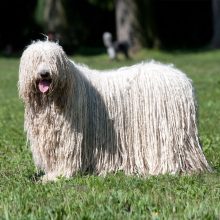Hungarian Puli
Lifestyle Needs

The Hungarian Puli is famous for its thick, corded coat which demands a great deal of attention. Apparently, in his native Hungary, the Puli needed a thick coat to withstand the intense cold and keep out the rain whilst herding flocks of sheep. His herding background means that the Puli needs plenty of exercise, including daily off lead walking and running. He needs to live in the countryside with access to wide open spaces. He is reputedly intelligent and trainable.
Genetic Diversity
(Known as Coefficient of Inbreeding: 'COI'. It should be as low as possible.)
The UK Kennel Club breed average COI is 5.1% - See 'A Beginners Guide to COI'
Gene Pool Size
(Known as Effective Population Size: 'EPS')
117.3
EPS is a measure of how many individuals are contributing genetically to a breed population. It is a measure of the size of the gene pool in a breed. Lower than 100 is considered critical by conservationists and below 50 brings a breed close to extinction. For more information see the Kennel Club article.
Health and Welfare Problems due to Conformation
(Body shape and physical characteristics)
- The Puli’s thick, wavy coat is easily tangled and matted and requires a lot of expert grooming. Care needs to be taken in hot weather to avoid overheating. Finger grooming is recommended to keep the cords separate. Bathing is necessary but it can take 12 hours for the coat to dry.
BVA/KC Health Schemes: www.bva.co.uk/chs
- Eye disease: Multi-focal Retinal Dysplasia (MRD) (litter screening); Cataracts; Progressive retinal atrophy (PRA); Primary lens luxation (PLL)
- Hip dysplasia: breed 5 year mean score 16 (parents should be lower)
- Elbow dysplasia: as low as possible
Estimated Breeding Values (EBVs) : EBVs for Hip Dysplasia are available for this breed
www.thekennelclub.org.uk/about-ebvs
DNA Tests Available
DogWellNet and IPFD Harmonisation of Genetic Testing for Dogs (HGTD)
www.dogwellnet.com/breeds
- Bardet Biedl Syndrome
Availability of a DNA test does not mean that it is always necessary or even desirable for breeders to use this test.
Other Breed-Specific Health Screening Schemes
- Bitches under 18 months not to be mated.
Ask the breeder to show you the certificates for the above tests/screening for both parents. If any of the above tests have not been considered necessary by the breeder (and there may be good reasons), ask her to explain why.
Other Diseases Reported
(For which there are currently no genetic or screening tests for sire or dam)
- Degenerative Myelopathy
Ask the breeder about the medical history of the parents, grandparents and great grandparents. Consider carefully whether to purchase a puppy if some of these or other diseases are in the family line.
Ask about the breeder’s policy in cases of serious genetic diseases occurring to your puppy in later life. Good breeders will request to be informed of such events in order to improve future breeding decisions.
You are strongly advised to buy from a breeder who uses (or is prepared to use) the AWF Puppy Contract and Puppy Information Pack (PIP): www.puppycontract.org.uk
The breeder should also be familiar with the CFSG/DBRG Code of Practice for Dog Breeding